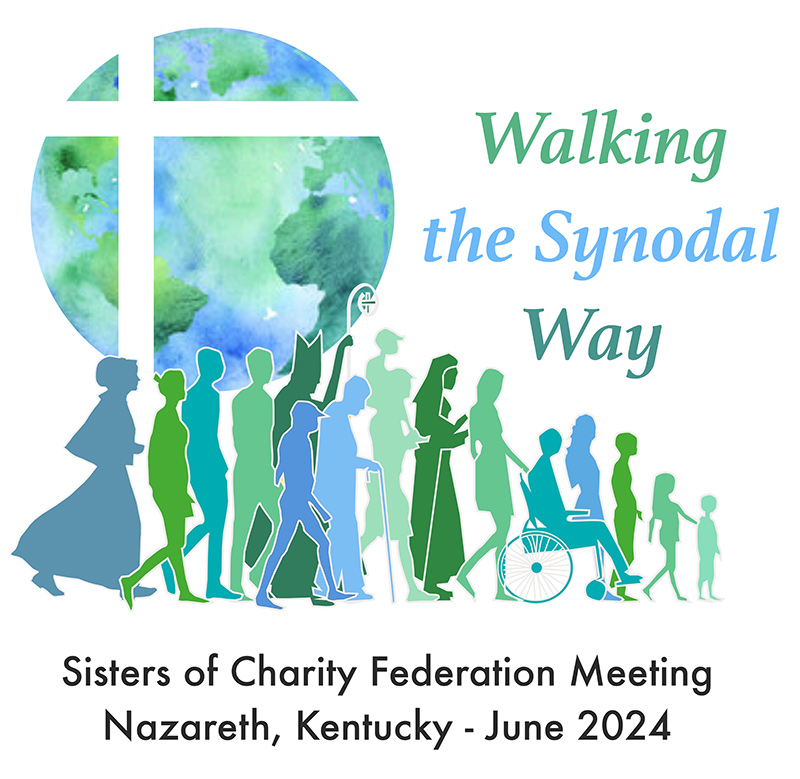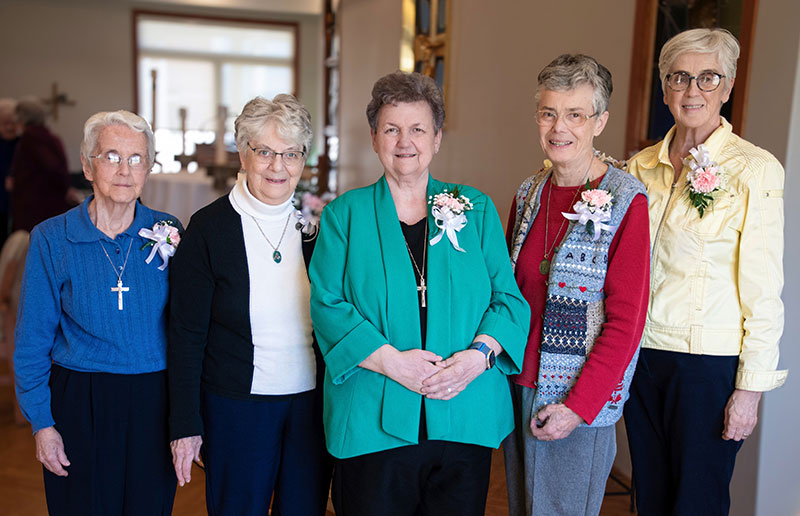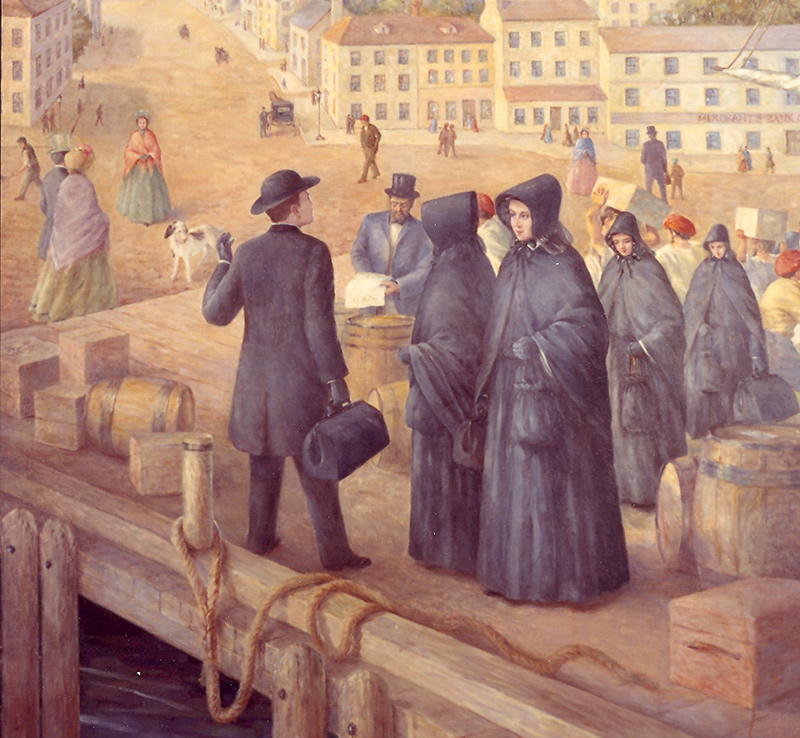Pope Francis has declared today, September 1, as the World Day of Prayer for the Care of Creation. In the last year, three different lay women were hired to work exclusively in care of creation/ social justice for their congregations. Journey along with Melissa Gibilaro (Sisters of Charity-Halifax), Carolyn Cromer (Sisters of Charity of Nazareth) and Amy Brierley (Sisters of Saint Martha of Antigonish) as they share what their congregations are undertaking and how you might renew your personal commitment to caring for our common home.
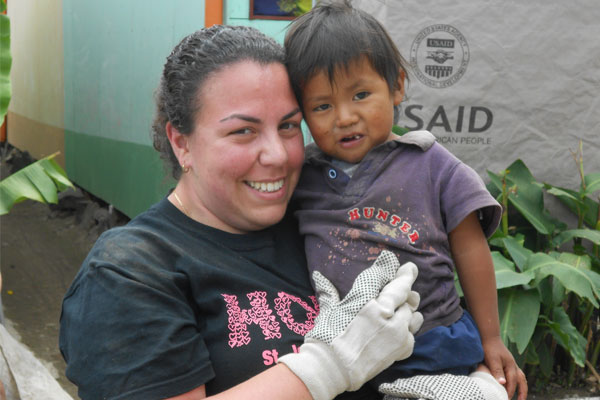
Melissa Gibilaro
1. What is your title and your role with the Sisters of Charity – Halifax? Also: Is your role a new one?
I am the Coordinator of Justice, Peace and Care of our Common Home. I started July 2016, and yes it is a new position.
2. What is your role? (Job Description)
It’s to keep the sisters and associates aware of different justice and peace issues so that they can become involved or stay involved in a practical way. And I do this for the entire SC-Halifax family in both the U.S. and Canada. Through weekly emails, newsletters, and action alerts, its letting them know what they can take action on. It could be contacting their government representatives, being a part of marches, or signing up for free webinars and courses to further their education. What I do is education based and it is action based. I also serve on the Congregation’s investments committee.
Through justice and peace work, I’m expected to collaborate with others and extend the Charity charism. A key part of that is to collaborate with the Vincentian Family, being a part of the justice reps and NGO liaisons group. I also look to engage young people – encouraging them to go to the House of Charity or attend the Vincentian Family Gathering.
3. What is your background and/or experience in this area?
I’ve always been involved in the justice field. I’ve done a lot of work in nonprofit. One of my first jobs upon graduating was working as a resident advisor with homeless and at-risk youth – getting to understand the issues that face that population – for 2 years. The bulk of my career has been working as a campus minister at St. John’s University in New York. My responsibilities there were to coordinate Vincentian service projects for the students, locally, nationally and internationally, and educating the students on justice issues. Taking this position on with the Sisters of Charity has been the next step. I see my career as a bit of a progression – working in direct service to people in need to advocating for those needs to now working to address the root causes of broken systems.
4. What are you currently working on?
I’m part of a team working on a retreat for survivors of trafficking – that’s a collaboration between Halifax, New York and St Elizabeth – partnering with Lifeway Network for advisement and recruiting participants. Our goal is to have it be a hope-building experience for the women. We’re aware of this type of retreat only happening once before in the U.S. I’ll also be participating in some of the events of the ICCR fall meeting. I’m hoping to put together a young professionals weekend sometime in the fall at House of Charity, providing an extended weekend of service and reconnecting. The target would be young adults who’ve been connected with the Vincentian family over the years. For this year’s Season of Creation (Sept 1 – Oct 4), we’ll be finalizing and offering an opportunity to utilize that season to pray and to take simple action for ecological justice.
Congregation-wide we wanted to take the “welcoming the stranger” theme and address an issue that’s pertinent to Canada and the United States. We’re looking at racial tensions – in Canada there’s continuing indigenous issues and reconciliation facilitation, and in the US, well, we’ve seen things explode around white supremacy rallies and the counter protests to those events, as well as the continuing issues around police brutality, immigration and refugees. Feelings of prejudice exist because we don’t understand each other. If we can eliminate those barriers, we can break down some of the prejudice. We’re focusing on the idea of looking at racial injustice, and looking at white privilege. How can we facilitate conversations in our community, and then be agents in our community to create spaces for those people to come together?
5. How does your role fit into the congregation’s stance on ecological & social justice issues?
Halifax has three corporate stances: one on water, one on human trafficking, and the other on international debt. We’re considering creating one that’s focused on care of creation or climate change. Our stances drive us to be more active and vocal for timely events like the pipeline construction in Standing Rock and other places. Trafficking has been an issue continually in the forefront for the Sisters over that last decade or so. We have Sisters directly involved in that work in New York, Boston and Vancouver, so the urgency of helping those who are trafficked is always in our minds. There will usually be something about human trafficking in my weekly emails.
The Sisters who are in active ministry address a broad range of social and environmental justice issues. Having a Coordinator like me brings all of those issues to everyone’s conscious. And not only do I bring those pieces together, but can present other issues where sisters may not be involved in active ministry.
6. How does your congregation actively practice ecological & social justice?
For ecological justice, there’s, of course, been a focus on Laudato Si. This year, Fr. Terry Moran with the Sisters of Charity of Saint Elizabeth created a calendar for Lent with the theme “Living a Laudato Sí Lent.” I incorporated his suggestions into social media graphics so that we could live out care of creation during those 40 days, to be more ecologically and socially conscious. Many years ago the sisters decided to be more aware of using bottled water and stopped their individual and large scale purchase of it. Not only is plastic harmful to the environment, but access to water is a human right and should be free and accessible to all, not a commodity.
We have one Sister at our retirement home in Wellesley, MA who has been composting since 2000. Composting reduces our carbon footprint by helping to eliminate food waste and turn it into fertilizer for their garden. Two sisters in British Columbia work in earth literacies. They run retreats and programs, host lectures, and educate people on different earth and environmental care issues. Others facilitate retreats around earth issues.
7. What are your hopes going forward for the congregation?
There’s an enthusiasm and a passion that already exists in the sisters. Yet, I would like to see it focus in larger numbers around specific issues. I believe our activism can become more visible – are we going to those marches or protests with our Halifax banner? Are we making public statements around key peace and justice issues? Our motivation to do what we do – i.e. advocating and fighting for the rights of people and the environment – is rooted in our personal faith. We shouldn’t take for granted that people on the outside automatically assume or understand that. We need to articulate the connection between our advocacy and our spirituality, our Catholic faith, our Vincentian charism.
My hope is that our sisters are more visible witnesses in the community. People will see what the sisters do because of their faith, and see the connection between the faith and justice. Whatever we do, whatever actions we take, is an opportunity to make a statement. In that visibility, you make a statement about not only about human and environmental rights, but about what Catholics and Christians believe.
8. What does your personal commitment to ecological sustainability look like, and how does it play out in your life?
It’s a part of my everyday life. I kind of address or embrace it in the simple things. Not buying bottled water, being aware of the waste I create. My community in New York City is a trial neighborhood to compost on a grand scale. I make sure all of our food waste is composted. I make sure we recycle what we can. We seek out local products and buy from farmers markets. I stay aware of opportunities to speak out. Every opportunity I have to sign a petition, call a representative, or speak on behalf of the environment, I do that. I do that in spite of my representatives being very in favor of protecting our environment.
9. What are some things that your average Joe could do to care for the earth? What are some steps one could take?
When you have the opportunity to use public transportation, or walk, or bike somewhere, do that. I started walking to work and walking home, saving some gas each week. Walking is actually quicker than using public transportation for me! People can be more aware of meat production and how it harms the environment, or crops that require much more water than others, or being aware of the shipping required to get crops places – especially out of season! Eat locally produced food. Buy reusable water bottles or travel mugs, and reusable shopping bags. A huge thing that people can do is be aware of how much one-time plastic they use. At our current rate of consumption and disposal, by the year 2050, there will be more plastic in the ocean than fish. Do everything you can do to not put plastic into the environment.
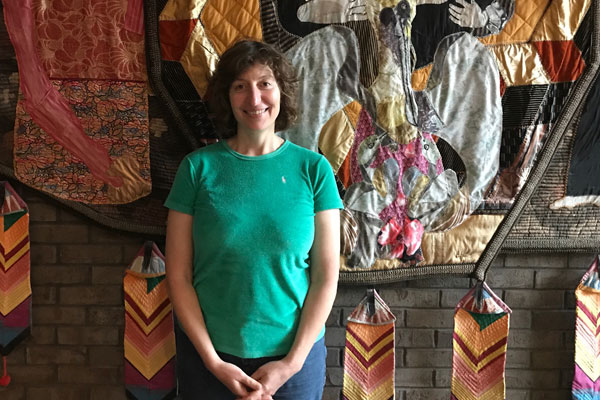
Carolyn Cromer
1. What is your title and your role with the Sisters of Charity of Nazareth? Also: Is your role a new one?
I am the Director of Ecological Sustainability. The position was created earlier this year, and I started at the beginning of April.
2. What is your role? (Job Description)
My role is to support the SCNs in their efforts to care for the Earth. I guide the SCNs in developing long-term sustainability efforts in keeping with their mission, vision, and operating principles. This includes fostering a culture of ecological spirituality in reverence of the sacredness and interconnectedness of all of God’s creation. I provide educational opportunities for leadership, sisters, and associates to grow in understanding of sustainable and regenerative principles to inform congregational decisions. In addition, I am helping them in their discernment of the long-term future of their Nazareth buildings and campus, including permanent conservation of open land.
3. What is your background and/or experience in this area?
I have Masters Degrees in Ecology and Forestry. Most of my professional career I have managed natural areas for state nature preserves and land trusts. I’ve also worked for a city parks department as an environmental project manager and planner. I have a background in community development as a legislative aide, Peace Corps Volunteer, and environmental educator and recycling coordinator in eastern Kentucky.
4. What are you currently working on?
The SCNs have a long history of sustainability. They have invested in solar panels at the Nazareth campus and in India, installed on-demand hot water heaters, are phasing in LED bulbs throughout Nazareth, grow some of their own food, and have hybrid cars in their fleet in the Western Province. In our Eastern Province, sisters participate in car-sharing and raise awareness about the environment through community projects. What I’m doing is supporting these existing efforts.
One of the things we are focusing on is a congregation-wide sustainability action plan. The executive committee just passed a goal to reduce greenhouse gas emissions to zero by the year 2037 in the Western Province and 2047 in the Eastern Province. That’s going to be a major effort that will drive what we are doing for sustainability in the next 20-30 years. On the Nazareth campus we are going to start with an energy audit and waste audit. We have set a goal to become a zero-waste campus. We’ll then expand our efforts to the rest of the congregation.
We’re also going to be looking at the land and building on the Nazareth campus. The community set guiding values and principles in 2014 that the future of the land and buildings will include eco-friendly consciousness. We are going to go through a process to collect input from all the sisters in the congregation and try to discern how the land and building can continue to serve the SCNs’ mission of caring for the Earth and the poor, especially women.
5. How does your role fit into the congregation’s stance on ecological & social justice issues?
Before my position was created, the congregation already had an office of social and environmental justice. The person in that role focuses on environmental issues primarily from a social justice perspective. My position focuses on the science and conservation side of sustainability, but I work very closely with the office of social and environmental justice, because it’s all related. You can’t leave out the social justice or economic parts of an issue and still create a truly sustainable future.
6. How does your congregation actively practice ecological & social justice?
The SCNs have passed several corporate stances related to ecological and social justice on topics of water and human trafficking. We have published statements against war, to cancel debt of heavily-burdened countries, on immigrants and refugees, and health care. In addition, the SCNs are very active in local and regional issues relating to ecological and social justice. We collaborated with a number of other groups to keep the Bluegrass Pipeline from bringing natural gas across Kentucky. In India and Nepal, World Environment day is celebrated with marches, public meetings and cultural programs with local action to protect our environment. Some have planted trees and shared the importance of saving water. Land rights are also taught so that people do not have their land taken from them. Other social justice topics include education and self-help groups that work to empower women.
7. What does your personal commitment to ecological sustainability look like, and how does it play out in your life?
I try and consider the environmental impacts of everything I do, a daunting task. I do not always do what is best for the environment, but I try to be aware of the implications and make the best decision possible. This plays itself out by living in a modest-sized home, limiting the number of biological children in our family, bicycling or taking the bus when possible, eating a primarily plant-based diet, hanging clothes on a line, growing a vegetable garden, supporting local farmers, limiting energy use in our home, and choosing to drive or take public transportation instead of fly.
8. What are some things that your average Joe could do to care for the earth? What are some steps one could take?
A study recently came out from Lund University in Sweden to answer the question of what personal choices make the biggest difference to climate change. They include, in order of impact: have one fewer child, live car-free, avoid flying, buy green energy, eat a plant-based diet, replace a typical car with a hybrid, wash clothes in cold water, recycle, hand-dry clothes, and upgrade light bulbs to LED.
In addition, it is incumbent on all of us who are educated about these issues to put pressure on political and corporate leaders to invest in a renewable future. In order to achieve our climate change goals, we need the cooperation of fossil fuel industries, and they are probably not going to change without pressure from consumers and political leaders.
Individuals can divest of any investments in the fossil fuel industry, or encourage their mutual funds to divest. We all know that money talks, so as consumers and investors, we have an incredible amount of power to promote change. Everything we do to reduce our impact on the Earth is important, but we also need to be honest about which actions have the greatest impact. Unfortunately, recycling alone is not going to keep climate change under control. We have the chance to do more. The results can be a better life balance, better personal health, and certainly a healthier world.
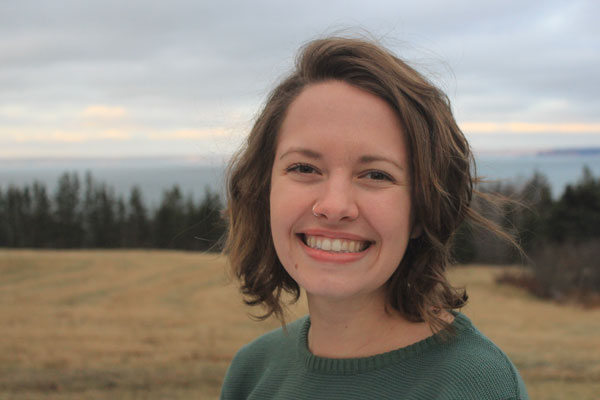
Amy Brierley
1. What is your title and your role with the Sisters of St Martha of Antigonish? Also: Is your role a new one?
My title is Coordinator of the Martha Justice Ministry: Embracing our Neighbours and Common Home. The Coordinator role is a new one.
2. What is your role? (Job Description)
My role is to help foster further awareness and advocacy around issues of social and ecological justice, both for the Marthas and also in collaboration with organizations and communities with which the Marthas live and work. My position works closely with Leadership, the Sisters, and a Core Group, consisting of both Sisters and lay people with rich life experience in various realms of social and ecological justice. The position of Coordinator is a new one for the Marthas, but their commitment to these issues is longstanding. The Marthas have a long and rich history of involvement in justice work. As the Marthas’ commitment to and understanding of justice evolved over time, the Sisters decided to bring their work in the realms of social justice and ecology into closer relationship through the creation of the Martha Justice Ministry.
3. What is your background and/or experience in this area?
In 2015 I graduated from St Francis Xavier University, having studied Development Studies and Political Science. I feel very grateful that a lot of my learning, inside and outside of the classroom, was rooted in the community of Antigonish. I first learned about the Marthas and their involvement in the Antigonish Movement and continued presence in the community in several of my classes. Following graduation, I had the opportunity to deepen my relationships here through the OceanPath Fellowship – a community centered and experiential learning opportunity that allowed me to work with groups focused on community food security. I’ve been involved in community organizing for several years.
I would say that I have an interest in social movements and what it looks like for rural communities to contribute to social change. I also feel like these types of issues are ones that are rooted in my heart. Belonging, connectedness and justice have always felt very important to me.
My position with the Marthas is my first experience exploring these issues through the lens of a religious congregation. The intersection of faith and justice is one that’s really meaningful to me. In being with the Marthas, I’m finding that I am learning so much about the ways in which they approach peace and justice. I’m learning so much from them about how to be in the world and the diverse ways one can affect change.
4. What are you currently working on?
Currently, we are working to build a foundation for what is to come. For me it’s been a lot of learning and getting to know the Marthas – asking questions and conversing about where we will go in the future. What can we be involved in that’s meaningful, and what are we already involved in? We are journeying on a new and evolving path with the Ministry.
So far, my days have consisted of learning, relationship building, getting to know the Sisters, deepening my understanding of the Martha charism and mission, hosting a couple of workshops/discussions to learn and share with the Sisters on different topics and contributing to some work that is already underway. Recently, for example, the Marthas hosted the Small Farms Expo – an event facilitated by the Nova Scotia Department of Agriculture and partners – which brought together small-scale producers from across the province to share wisdom and skills here at the Bethany grounds.
Beyond this type of work, I have been journeying along with the Core Group – setting our vision and goals for the Ministry.
5. How does your congregation actively practice ecological & social justice?
The Marthas pray and act for many different issues in their everyday lives. The Sisters are very knowledgeable about issues in our community and the world, and are actively involved in living out right relationships in their everyday lives. So many of the Sisters continue to have such a significant impact on the people they interact with and places in which they live and work.
The Marthas have done a lot of work in stewardship of land here at Bethany, making choices about conservation, biodiversity, and ecological landscaping practices, as well as the installation of solar panels. Our New Growers program here provides an opportunity for new growers to experience running their own market garden operation using ecological practices, while providing an encouraging model for what communities can do to support and nourish local, small-scale and ecological production. The Marthas are also part of many organizations that focus on community building, affordable housing, poverty alleviation, and many other issues.
I personally think that at the core of social and ecological justice work is what is in a person’s heart. I believe that the Marthas are really committed to doing the heart work. The values and charism of the Marthas embody a commitment to social and ecological justice. The Marthas live in a way that is grounded in listening, learning and being with people to enact change.
6. What are your hopes going forward for the congregation?
Because this position is one evolving part of the Marthas charism, I hope that this Ministry contributes in a meaningful way to this calling.
7. What does your personal commitment to ecological sustainability look like, and how does it play out in your life?
I try to be mindful about the impact my everyday actions have on the world, and so when I can, I aim to make decisions that lighten this impact—for example, I try to buy most of my clothing second hand, and attempt to stay abreast of the ways in which materials, packaging and products that I consume impact the environment
In a more personal sense, maybe, my relationship with ideas of ecological sustainability and their intersection with ecological justice are rooted in a dive inward, that I hope then informs my outward being. More so, I feel quite deeply that there’s a lot of healing that must happen in the world and in the place that I call home. I think we have it in us to live in right relationship with Mother Earth and our neighbours. Being a part of community is an important part of this, as I think that is where meaningful relationships are built that allow us to listen open and honestly, learn and act together in calling out and remedying injustice.
8. What are some things that your average Joe could do to care for the earth? What are some steps one could take?
Being present with people and our surroundings is foundational. Being open to the experiences of those around us and having conversations with people who are learning about the world through different lenses is important. I think that coming into deeper relationship with our surroundings help to guide us in seeking to change for the better. We are in a very complex moment in time, and I think this is one profound way in which we can start to work through these complexities.

